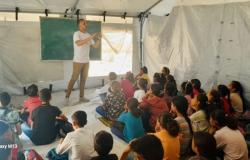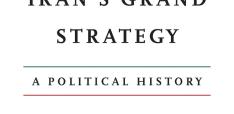Education Under Fire: Shaping Education for Youth Futures in Gaza

Salam Al-Ostaz argues that there is a moral imperative to redefine the purpose of education in Gaza to cultivate resilience and consciousness, promoting youth participation as a democratic right, and positioning education as the cornerstone of awareness and rebuilding.
Education is fundamentally a humanizing process that goes beyond mere knowledge transmission or workforce preparation. As Paulo Freire (1970) famously argued, education must be "the practice of freedom," enabling individuals to critically engage with their reality and transform it. It is through education that individuals develop their full potential as conscious, resilient, and ethical beings who can contribute meaningfully to society. Education embodies a right that sustains human dignity, nurtures hope, and fosters social justice (UNESCO, 2015).
In contexts marked by conflict and systemic oppression, education must be understood not only as a tool for personal development but as a powerful mechanism for resistance, healing, and the reconstruction of communities. It plays a critical role in the larger struggle for human rights and peacebuilding, serving as both a means of empowerment and a catalyst for societal transformation.
This dual role of education becomes profoundly evident in Gaza, where the ongoing war, blockade, and systemic violence inflicted upon Palestinians have not only caused massive physical destruction and human loss but have also deeply disrupted the educational system and extinguished the aspirations of generations of youth. This crisis is far more than a humanitarian emergency—it is an epistemic and existential assault on education as a fundamental human right and a foundation for development. In the face of what scholars and institutions increasingly recognize as a genocidal war (Albanese, 2024; Amnesty International, 2024; Human Rights Watch, 2024), the urgency to rethink the very purpose and structure of education has never been greater.
This chapter presents a transformative vision for education in Gaza rooted in decolonial thought and critical pedagogy. It advances four interconnected dimensions: (1) redefining the purpose of education to foster resilient, conscious, and critically engaged youth; (2) promoting participatory education that amplifies youth voices; (3) addressing the impact of war on education; and (4) positioning education as a catalyst for reconstruction and sustainable peace.
Redefining the Purpose of Education: Building Resilient and Conscious Youth
Education, at its core, must be reclaimed as a means of building the human being—one capable of healing, resisting, and rebuilding. More broadly, and especially in contexts marked by protracted conflict, structural violence, and collective trauma, education must meaningfully respond to the complex realities that learners face. It should cultivate critical consciousness and agency, moving beyond rote learning to foster inner peace, resilience, and social justice. Most importantly, education must recognize the lived experiences of young people, affirm their struggles, and empower them to shape a future grounded in hope, dignity, and purposeful action.
In this context, decolonial education emerges as a necessary framework for reclaiming the true purpose of education by dismantling dominant structures and centering more just and inclusive ways of knowing. Decolonial education seeks to challenge and dismantle the dominant Eurocentric frameworks that have historically shaped knowledge production, aiming instead to center indigenous, local, and marginalized perspectives. It calls for rethinking the purpose of education beyond colonial legacies to focus on human dignity, cultural identity, and social justice. Redefining the purpose of education in this context means creating spaces where learners can engage critically with their realities and develop the agency to transform oppressive systems. According to Mignolo and Walsh (2018), decolonial education emphasizes "learning to unlearn" colonial structures and "relearning" from alternative epistemologies that have been historically silenced. This redefinition positions education as a means to cultivate awareness, resistance, and collective empowerment, enabling students to connect learning with their lived experiences and cultural heritage (Andreotti et al., 2015). Ultimately, decolonial education reorients the purpose of learning toward healing, liberation, and the construction of more equitable futures.
Research has shown that education can function as a protective factor for children in conflict zones. Dryden-Peterson (2016) notes that “education in displacement and conflict settings offers not just knowledge but also the possibility of hope, identity, and belonging” (p. 6). In Gaza, youth have endured displacement, the loss of families, and the destruction of schools—yet many still pursue learning as a form of resistance. Accordingly, I believe that education must meet this moral courage with equally courageous pedagogy.
Resilience, as defined by Masten (2014), is “ordinary magic”—the capacity of individuals to adapt and thrive despite severe adversity. Thus, resilience must be cultivated through intentional educational practices that integrate trauma-informed approaches, cultural rootedness, and community solidarity. As Qouta et al. (2012) emphasize in their study of Palestinian children, schools can provide psychological buffers against violence when they offer structure, support, and meaning. However, the genocidal war on Gaza resulted in unprecedented levels of destruction, where not only learners were harmed, but also teachers, school leaders, and the entire educational infrastructure were systematically targeted and devastated. This raises critical questions about how these psychological buffers can be sustained when the very actors and spaces that provide them are under direct attack.
Significantly, the importance of redefining education in building resilient and conscious youth lies in its potential to transform learning from mere knowledge transmission into a holistic process that fosters critical thinking, emotional strength, and social responsibility. Traditional education systems often focus on standardized curricula and rote memorization, which can limit young people’s ability to navigate complex social realities, especially in contexts affected by conflict and trauma. Redefining education means prioritizing learners’ lived experiences, promoting critical consciousness, and equipping youth with skills to adapt, resist, and contribute positively to their communities (Freire, 1970).
In this light, redefining education becomes an act of resistance—not only against the physical violence that devastates lives and educational spaces but also against the ideological violence that seeks to erase cultural identity and impose dominant worldviews. This affirms that the goal of education is not merely to survive, but to develop the full humanity of learners—what Nussbaum (2010) calls “education for human development,” which fosters empathy, critical inquiry, and global citizenship. Gaza’s youth deserve no less.
Participatory Education: Youth Voice in Rebuilding the Educational System
Participatory education is an approach that actively involves learners in decision-making processes concerning their own education. Rather than treating students as passive recipients of knowledge, this model positions them as co-creators of learning, policy, and school governance (Fielding, 2004). It also empowers youth by providing them with meaningful opportunities to influence the structures and content of their learning environments, thereby promoting agency, ownership, and social responsibility (Mitra, 2004). This model aligns with decolonial perspectives that reject hierarchical, top-down educational systems and instead advocate for collaborative and contextually relevant learning processes (Freire, 1970).
Hence, the exclusion of youth voices from educational reform contributes to systems that often fail to reflect their needs, experiences, and aspirations. In a decolonial framework, education must shift from something done to youth, to a process built with them. Participation is not a luxury, it is a necessity for relevance, justice, and transformation.
Recent studies underscore the transformative power of participatory education in conflict environments. For example, Mitwalli et al. (2025) examined a participatory action research (PAR) project involving Palestinian youth with disabilities in Gaza, where these youth co-designed the research methodology, collected data, and reflected on their experiences, while receiving tailored psychosocial support . This study highlights that even under extreme adversity, young people can lead processes that build resilience, promote healing, and elevate marginalized voices.
Other participatory examples already exist. Initiatives like Pal-Think’s Civic Education Corps have engaged Palestinian youth in shaping community-focused educational projects, where young participants designed and implemented awareness campaigns and peace-building activities that directly addressed local needs (Pal-Think, 2015). Similarly, UNESCO’s NET-MED Youth Initiative in Gaza has empowered young people to preserve cultural heritage and advocate for inclusive education, offering a model for youth-led action that integrates tradition and innovation (UNESCO, 2015). Additionally, Local initiatives such as We Are Not Numbers, a youth-led writing mentorship program launched in Gaza in 2015 under the Euro-Med Monitor, embody the principles of participatory education by empowering participants to actively shape their own narratives, engage in peer-led learning, and contribute to collective knowledge production. Through writing in English, mentoring, and public storytelling, youth become co-creators of knowledge rather than passive recipients, challenging dominant narratives and reclaiming their identities (WANN, 2015–2025) -Writer and professor Refaat Alareer, one of the organization's founders, was murdered by the Israeli occupation in the genocidal war on Gaza in 2023.
However, the goal extends beyond individual projects; it is about establishing a sustainable participatory culture where youth are consistently involved in curriculum development, school leadership, and educational governance. Such inclusive approaches not only strengthen democratic values but also build the foundation for an education that resists colonial legacies, centers local agency, and contributes to long-term peacebuilding. Hart (1992) describes youth participation as a ladder, ranging from manipulation to genuine shared decision-making. Gaza’s context demands that we move beyond symbolic inclusion and embrace models that place youth at the center of educational design and governance.
In addition, participatory education promotes social cohesion. As Banks (2008) argues, education that incorporates multiple perspectives and encourages civic participation helps build the competencies necessary for living in societies affected by conflict. In Gaza, where war has naturally led to societal challenges, youth engagement in educational reform can contribute to strengthening community unity and advancing peacebuilding efforts.
Participatory education prepares youth to become active citizens, capable of engaging in dialogue, resolving conflicts, and imagining alternatives to violence. As Hart et al. (2004) highlight, education that values youth voice can counter alienation and foster belonging—a key antidote to despair in times of war.
Impact of War on Educational Infrastructure: Urgent Action and the need to a Transformative Vision
The current educational crisis in Gaza, shaped by the ongoing war, reveals the urgent necessity to rethink the role and purpose of education for the youth. The destruction of schools, universities, and the tragic loss of educators and students have not only halted traditional learning but have profoundly affected the social and psychological well-being of the new generation. As this chapter argues, education in Gaza must be reimagined not merely as a tool for knowledge acquisition, but as a pathway for youth empowerment and the reconstruction of Gaza’s social fabric. This devastating reality challenges the existing educational paradigms and demands a transformative vision that prioritizes resilience, empowerment, and peacebuilding to secure a hopeful future for Gaza’s youth.
As of mid-2025, the situation in Gaza remains fluid, and the educational crisis continues to unfold. The ongoing war in Gaza has inflicted catastrophic damage on the education sector, severely disrupting access to learning and destroying much of the educational infrastructure. Recent estimates indicate that over 95% of educational facilities are being damaged or destroyed, with approximately 88.5% requiring major rehabilitation or complete reconstruction (OCHA, 2025a). Schools and universities are currently converted into shelters for displaced families, further interrupting education (Middle East Eye, 2025). That is, if any schools or universities remain standing after the widespread destruction.
The human toll is devastating. Hundreds of teachers have lost their lives, alongside thousands of students who are being murdered, injured, or displaced (AP News, 2025; OCHA, 2025b). By mid-February 2024, reports documented that more than 450 academic and administrative university staff had been killed, including university presidents, deans, and professors (Rabaia & Habash, 2024). As the war on Gaza has continued, these numbers have likely increased further, exacerbating the severe loss of leadership, expertise, and institutional capacity within Gaza’s higher education sector.
Efforts to continue education, such as through temporary learning spaces and online platforms, face enormous challenges including electricity outages, limited internet access, and widespread psychological trauma among students and educators (Save the Children, 2025; Ibrahim, 2025). It is estimated that hundreds of thousands of school-age children are currently unable to attend regular classes, and many university students face disrupted academic progress (AP News, 2025; OCHA, 2025a).
The psychological impact on children and youth is profound. Studies show that more than 90% of children exhibit severe psychological distress, with symptoms including trauma, fear, aggression, and depression, and long-term risks of PTSD (Borger, 2024; McVeigh, 2024; Lavi et al., 2025). University students similarly suffer from mental health challenges, compounded by the destruction of their academic environments and loss of community (University of Cambridge, 2024a, 2024b). These figures represent a snapshot in a rapidly evolving crisis and are continuously increasing at the time of writing. The scale of destruction and trauma—largely driven by the ongoing policies of occupation—demands new approaches. This crisis reveals the urgent need to reimagine education not only as a tool for knowledge but as a vital means of resilience, empowerment, and resistance. Rethinking education is essential to secure meaningful futures for Gaza’s youth and to challenge the systemic barriers imposed by occupation and conflict.
In line with these concerns, I am currently conducting a research project that critically examines the educational crisis in Gaza during the ongoing genocidal war. The research seeks to analyze the current state of the education system, assess the impacts of the war on students, educators, and educational institutions, and propose both solutions and long-term strategies to address these unprecedented challenges. This study further aspires to provide a transformative vision that contributes to the revival and sustainable development of the educational sector in Gaza, while fostering a future-oriented learning environment.
Education as a Catalyst for Reconstruction: Youth at the Core of the Future
Post-war recovery in Gaza must prioritize not only rebuilding physical infrastructure but reimagining the intellectual and human foundations of the future. Education is a critical tool for reconstruction, both materially and symbolically. It is through education that youth can reclaim agency, preserve cultural identity, and rebuild what has been destroyed.
The genocidal war on Gaza resulted in the destruction of hundreds of schools, universities, and libraries, erasing years of educational progress. This requires building a more just and resilient educational system—one that equips youth to lead. In this context, Quaynor (2011) indicates that citizenship education is considered a fundamental part of reconstruction in post-conflict societies, as it helps instill democratic values and build social cohesion for a more just and peaceful future. All forms of education play a role in transmitting societal norms and values, and international organizations such as the United Nations and the World Bank emphasize democratic citizenship as a key goal of post-conflict education. The ultimate objective is to shift from emergency education towards education that focuses on development, citizenship, and empowering youth with the skills needed for active participation in rebuilding their communities.
In addition to rebuilding physical and intellectual foundations, post-war education must integrate psychosocial support and trauma-informed practices. The psychological scars left by conflict deeply affect young people’s capacity to learn, engage, and lead. Educational programs that incorporate mental health services, peer support, and resilience-building strategies help youth overcome trauma and foster emotional well-being. This holistic approach nurtures not only individual healing but also strengthens community cohesion, empowering youth to participate fully in reconstruction efforts. Miller and Rasco (2004) emphasize that education addressing psychosocial needs is essential in conflict-affected settings to restore hope and agency among young learners. Similarly, Betancourt et al. (2013) found that trauma-informed educational interventions significantly improve psychosocial adjustment and academic outcomes for children in war-affected regions.
Youth must be trained not only in academic subjects, but in entrepreneurship and civic engagement. Investments in vocational training, digital literacy, and local knowledge systems can enable young Gazans to contribute meaningfully to their communities. UNESCO (2011) describes this as “learning to live together”—a foundational principle for any sustainable peace.
Empowered through transformative education, Gaza’s youth can move from being victims of war to architects of the future. This is not idealistic—it is necessary. Therefore, education must be the seedbed of a new Gaza, one that rises not just from the rubble, but from renewed dignity and vision.
Conclusion: Toward a Human-Centered Vision of Education in Gaza
As a Palestinian academic from Gaza, I view the war on education as not only a material reality but a symbolic one—a war against hope, memory, and future. To respond to this, we must reclaim education as a tool for healing, liberation, and reconstruction. The vision presented in this chapter insists that education is fundamentally about building the human being—not merely the worker or the student, but the whole person imbued with values, identity, and agency.
Redefining the purpose of education to cultivate resilience and consciousness, promoting youth participation as a democratic right, and positioning education as the cornerstone of awareness and rebuilding—these are not theoretical ideals. They are moral imperatives in the face of genocidal violence. Crucially, this education must embrace a decolonial approach—one that protects Palestinian cultural identity from colonial influences and from attempts to erase identity and control the narrative, strengthens its roots, and fosters critical consciousness. Decolonial education empowers youth not only to rebuild physical and social structures but also to preserve intellectual sovereignty and cultural dignity, making education a true tool of liberation and resistance.
The path forward demands collective responsibility from local communities, educators, policymakers, and the international academic and humanitarian communities. Gaza’s youth cannot rebuild their futures alone. They need educational spaces that prioritize their voices, curricula that reflect their realities, and sustained global solidarity that affirms their right to learn, heal, and lead. Education must not simply resume; it must be reimagined in ways that honor their resilience and potential.
If Gaza is to rise, it will be through its youth. And if youth are to rise, it must be through education that sees them, hears them, and trusts them to lead.
Salam Al-Ostaz is an Assistant Professor of Curriculum and English Language Teaching Methods, Head of the English Department, and member of the editorial board for the Journal of Humanities at Israa University. She is also a Postdoctoral Research Fellow at the Department of Interdisciplinary Humanities at King’s College London.
Imatge: The photo was taken by Motasem Al-Banna specifically for this chapter on May 31, 2025, with courtesy of the author’s family. It shows Mahmoud Al-Ostaz, the author’s brother, delivering educational sessions as part of his professional duties during the war in Gaza.


